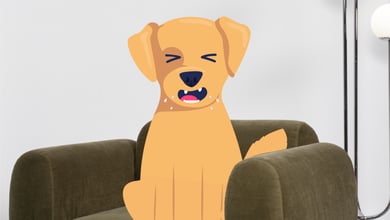Dog Chewing Paws: Causes, Symptoms, & Treatment

Table of Contents
If your dog is constantly biting and licking their paws, it may be a sign of an underlying issue. While occasional licking is normal, persistent or intense biting could indicate discomfort from allergies, pain, or anxiety. Thankfully, there are many ways to help your dog.
Learn in this blog why dogs bite their paws, what treatment options you have, & what you can do to prevent this issue from continuing!
Key Takeaways:
- While occasional licking and chewing of paws are normal for dogs, excessive or continuous chewing may indicate an underlying issue requiring attention.
- Dogs may chew their paws for various reasons, including pododermatitis, allergies, pain or injury, grooming issues, or anxiety.
- Remember to consult with a veterinarian for personalized advice and to address any persistent or concerning paw chewing behavior in your dog.
Why Do Dogs Bite Their Paws?
Dogs may bite, chew, and lick their paws for various reasons. Here are common causes and their related symptoms:
Dog Pododermatitis
This happens when the paws get inflamed, including the nail beds, paw pads, and spaces between the toes. If your dog is dealing with pododermatitis, you might see redness and swelling and notice them licking or chewing their paws excessively.
Related reading: Why Do My Dog's Paws Smell Like Fritos?
To treat it, your vet will determine the underlying cause, which could be a bacterial or yeast infection, allergies, or other conditions. Treatment options may include medications, such as topical or oral antibiotics, managing allergies, and providing supportive care to help the paws heal.
Dog Allergies
Allergies are a common reason for paw chewing. Dogs can be allergic to things like fleas, certain foods, or environmental factors. If your dog has allergies, they may show signs like intense itching, redness, recurrent skin or ear infections, and general discomfort.
Treating dog allergies involves identifying and avoiding the allergen when possible. Your vet might recommend medications like antihistamines, omega-3 supplements, or prescription drugs to manage itching and skin inflammation. Additionally, any secondary infections may require treatment with antibiotics.
Pain or Injury
Sometimes, dogs chew their paws due to pain or injuries. It could be a cut, growth, or arthritis causing them discomfort. If your dog is experiencing pain or injury, you may notice symptoms like limping, swelling, sensitivity, or visible wounds.
Treatment will depend on the specific cause. It could involve wound care, pain management medications, surgical removal of growths, or joint supplements for arthritis.
Nail or Grooming Issue
Issues like torn nails, overgrown nails, or matted fur between the toes can make dogs chew their paws. If your dog has any problems, they may exhibit signs like licking, biting, or limping.
Treatment involves addressing the specific grooming issue. For example, if the nails are too long, they must be trimmed properly. Removing mats or tangles will also help relieve discomfort and prevent further chewing.
Anxiety
Dogs experiencing anxiety may chew their paws compulsively. Signs of dog anxiety can include restlessness, panting, pacing, and lip licking.
If anxiety is the cause, treatment options can include behavior modification techniques, training, mental and physical stimulation, and sometimes medications prescribed by a veterinarian to help reduce anxiety and compulsive behaviors.
Should My Pet Be Seen by a Veterinarian?
1. Have you noticed changes in your pet’s appetite?
2. Does your pet have diarrhea or loose stools?
3. Have you noticed changes in your pet’s thirst/water consumption?
4. Is your pet having accidents in the house?
5. Is your pet pacing and unable to settle?
6. Is your pet panting more than usual?
7. Is your pet whining or vocalizing more than usual?
8. Is your pet shaking more than usual?
9. Is your pet hiding or avoiding physical contact more than usual?
10. Is your pet more lethargic and sleeping more than usual?
11. Are you concerned about changes in your pet’s behavior?
12. Is your pet scratching their ears?
13. Is your pet licking their paws more than usual?
14. Does your pet have a rash?
15. Is your pet moving more slowly than usual or having a harder time getting up or down?
View Results
Should My Pet Be Seen by a Veterinarian?
1. Have you noticed changes in your pet’s appetite?
2. Does your pet have diarrhea or loose stools?
3. Have you noticed changes in your pet’s thirst/water consumption?
4. Is your pet having accidents in the house?
5. Is your pet pacing and unable to settle?
6. Is your pet panting more than usual?
7. Is your pet whining or vocalizing more than usual?
8. Is your pet shaking more than usual?
9. Is your pet hiding or avoiding physical contact more than usual?
10. Is your pet more lethargic and sleeping more than usual?
11. Are you concerned about changes in your pet’s behavior?
12. Is your pet scratching their ears?
13. Is your pet licking their paws more than usual?
14. Does your pet have a rash?
15. Is your pet moving more slowly than usual or having a harder time getting up or down?
Share Quiz
Treatment for Dogs Chewing Their Paws
When it comes to treating a dog chewing on their paws, the treatment depends on the cause. Here are some common treatment options:
- Treating Inflammation or Infections: If the dog's paw chewing is due to inflammation or infections, the vet may prescribe antibiotics to fight off infections. For allergies, they might suggest avoiding allergens and using medications like antihistamines. Proper wound care and itch relief are essential.
- Managing Pain: If the dog is chewing their paws because of pain or injury, the vet may recommend pain medications like nonsteroidal anti-inflammatory drugs or joint supplements for arthritis. Surgery might be necessary in some cases.
- Grooming and Nail Care: If grooming issues like torn nails or mats are the problem, the vet will address the specific issue by trimming nails properly and removing mats. Good paw hygiene is essential.
- Behavior Modification and Anxiety Management: If anxiety or behavioral problems are causing the chewing, the vet might suggest behavior modification techniques, training, and providing mental and physical stimulation. They may also prescribe anti-anxiety medications or natural supplements.
How to Stop a Dog from Chewing its Paws
Because there are so many different causes of foot biting in dogs, it’s a good idea to see your vet if the problem persists or is causing concern. You may also consider trying the following to stop it:
- Find the Cause: Understand why your dog is chewing its paws, like allergies, pain, boredom, or anxiety.
- Paw Hygiene: Keep paws clean, check for injuries, trim nails, and remove tangles between the toes.
- Stimulation: Provide physical exercise and mental activities to prevent boredom.
- Address Anxiety: Reduce stressors, establish routines, and consider behavior modification techniques.
- Distract and Redirect: Offer chew toys or activities to divert your dog's attention from its paws.
- Vet Consultation: Visit a vet to rule out medical issues and get expert treatment advice.
Conclusion
If you notice your dog constantly chewing their paws, it could indicate an underlying issue. While occasional licking is normal, persistent biting may indicate discomfort. Understanding the causes, such as pododermatitis, allergies, pain, grooming issues, or anxiety, can guide treatment options. Maintaining good paw hygiene, providing stimulation, and addressing anxiety is key. If the problem persists, consult a veterinarian for proper diagnosis and treatment.
Book a visit with your vet today to help your furry friend find relief!
Frequently Asked Questions
What will happen if my dog keeps biting their paws?
If paw biting is not addressed, the condition will likely worsen and lead to secondary infections.
Should I put a cone on my dog to stop paw biting?
This is definitely an option. Especially if an infection is present, keeping your dog from licking and chewing will be essential to promote healing. However, taking steps to address the underlying issue is also essential.
What kind of training can help with paw biting?
There are many types and causes of anxiety, including separation anxiety, specific phobias (storms, fireworks, etc.), and generalized anxiety. It is best to work with your vet and a professional trainer specializing in positive training techniques to develop an individualized treatment plan involving training and behavioral modification.





